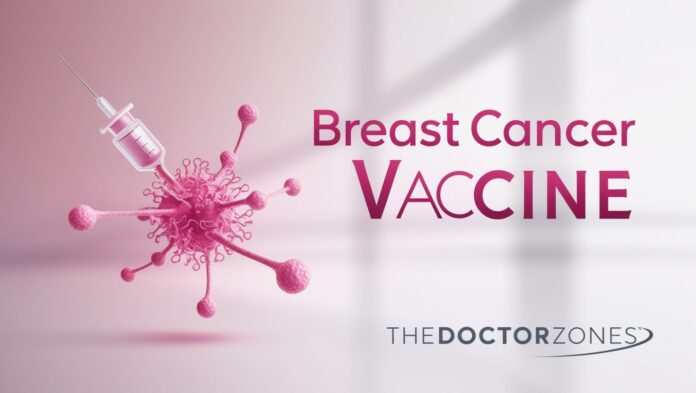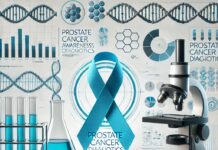Breast Cancer Vaccine
Breast cancer vaccination is an exciting and innovative treatment to prevent or treat breast cancer by stimulating the immune system to recognize and destroy cancer cells. This vaccine represents a major advance in the fight against breast cancer, giving hope to high-risk individuals and those battling the disease Although traditional treatments such as vaccines although treatment, surgery and radiation have been mainstays, the idea of having a vaccine that can stop or slow the growth of breast cancer is revolutionary. Also Read How to Treat Breast Cancer with Hyperthermia in Dogs
Table of Contents
ToggleWhat Is a Breast Cancer Vaccine?

Breast cancer vaccines are designed to prevent cancer in healthy people (prevention) or to treat those who already have breast cancer (treatment) These drugs work by stimulating the immune system identifies specific proteins or antigens in breast cancer cells, such as the endogenous HER2 protein.
- Prevention Vaccines: Aim to stop breast cancer before it starts, especially in individuals with high genetic risk.
- Chemotherapy Vaccines: Help the immune system target and destroy existing cancer cells, reducing the risk of recurrence and progression.
How Do Breast Cancer Vaccines Work?
Breast cancer drugs stimulate the immune system to produce antibodies or activate antibodies that can recognize and attack cancer cells. Here’s how they work:
- Targeting tumor-specific antibodies: Most breast cancer therapies are designed to target antigens such as HER2 (Human Epidermal Growth Factor Receptor 2) or other specific proteins expressed by cancer cells.
- Stimulate the immune system: The vaccine teaches the immune system to recognize these proteins as dangerous, prompting them to attack and destroy cells expressing these antigens.
- Activation of the immune system: The body’s natural defenses are activated, creating a long-lasting immune response that helps prevent cancer recurrence or spread.
Benefits of breast cancer vaccination
Breast cancer vaccination offers many potential benefits for prevention and treatment:
- Targeted Therapy: Unlike chemotherapy, which affects healthy cells as well as cancer cells, vaccines only target cancer cells, minimizing side effects comes to the table.
- Long-lasting immunity: These drugs can provide long-term protection by teaching the immune system to remember and attack cancer cells in the future.
- Less Side Effects: Compared to traditional treatments, vaccines generally have fewer side effects, such as a mild fever or localized pain the drug is applied.
- Preventing cancer from coming back: Medical vaccines can help prevent cancer from coming back after surgery or other treatments.
Types of Breast Cancer Vaccines

HER2-targeted vaccines
- These drugs target the HER2 protein, which is overexpressed in about 20% of breast cancers.
- Specifically, HER2-targeted vaccines are being studied for both preventive therapy in HER2-positive breast cancer patients.
DNA-based vaccines
- These drugs inject specific sequences of DNA into the body, allowing the immune system to recognize and attack cancer cells.
- DNA-based vaccines are still in early trials, but they show promise in fighting breast cancer recurrence.
Dendritic cell immunity
- These drugs use dendritic cells, which are immune cells that help recognize and attack cancer cells.
- Dendritic cell vaccines are personalized and require the cells to be harvested from a patient, trained to target cancer, and reintroduced into the body.
Peptide-based vaccines
- These drugs use short chains of amino acids (peptides) to introduce cancer-specific proteins into the immune system.
- Peptide vaccines are relatively easy to manufacture and are currently being tested in clinical trials.
Current Research and Clinical Trials

The breast cancer vaccine is still mostly in the experimental phase, with several clinical trials being conducted to test safety and efficacy. Initial results have been promising, with patients exhibiting strong immune responses and few side effects. Here are some of the major ongoing investigations:
- Phase I breast cancer prevention trials: Aimed at high-risk patients, these agents target individuals with a genetic predisposition to breast cancer.
- HER2-Positive Cancer Vaccine Trials: Testing the efficacy of vaccines in patients with HER2-positive breast cancer for further prevention.
- DNA-Based Vaccine Trials: DNA vaccines targeting tumor-specific antigens assess long-term immune response.
Challenges and Future Directions
While progress in breast cancer vaccination is promising, there are still many challenges to overcome:
- Complex tumor biology: Breast cancer is not one disease but has different subtypes, each with different characteristics. Vaccines should be designed to target a specific subtype.
- Universal vaccines in development: Researchers are working to develop vaccines that can target several types of breast cancer, including triple-negative breast cancer.
- Immune modulation: Vaccines must be designed to interact with the immune system without activating or stimulating the immune system the too much.
The future of breast cancer vaccination is bright, with continued research leading to more effective and safer vaccines Advances in immunology, heard with new technologies that the addition of self-administered medicine is paving the way for a revolution in breast cancer treatment and prevention.
Conclusion
The development of breast cancer vaccines offers a groundbreaking new approach to preventing and treating one of the most common forms of cancer worldwide. While these vaccines are still in clinical trials, the results so far are promising. Whether by targeting the HER2 protein, introducing DNA vaccines, or utilizing dendritic cells, these innovative treatments represent the future of cancer care. For individuals at high risk or those fighting breast cancer, vaccines could provide long-term protection and an improved quality of life.
FAQs About Breast Cancer Vaccines
1. What is a breast cancer vaccine, and how does it work?
A breast cancer vaccine is an immunotherapy that stimulates the immune system to recognize and attack breast cancer cells. It works by targeting specific proteins or antigens found on cancer cells, training the immune system to destroy them.
2. Are breast cancer vaccines available for everyone?
Breast cancer vaccines are still in the experimental stage, with most currently available only through clinical trials. Researchers are working towards making them available for both prevention and treatment in the future.
3. Can breast cancer vaccines prevent the disease?
Preventive breast cancer vaccines aim to stop cancer from developing, especially in individuals at high genetic risk. These vaccines are designed to boost the immune system to recognize and eliminate cancer cells before they form tumors.
4. What are the side effects of breast cancer vaccines?
The side effects of breast cancer vaccines are generally mild and may include symptoms like fever, soreness at the injection site, or fatigue. More serious side effects are rare but can occur, depending on the patient’s immune response.
5. How close are we to having a commercially available breast cancer vaccine?
While research is advancing rapidly, breast cancer vaccines are still in clinical trials. It may take several more years of testing before these vaccines become widely available for preventive and therapeutic use.








